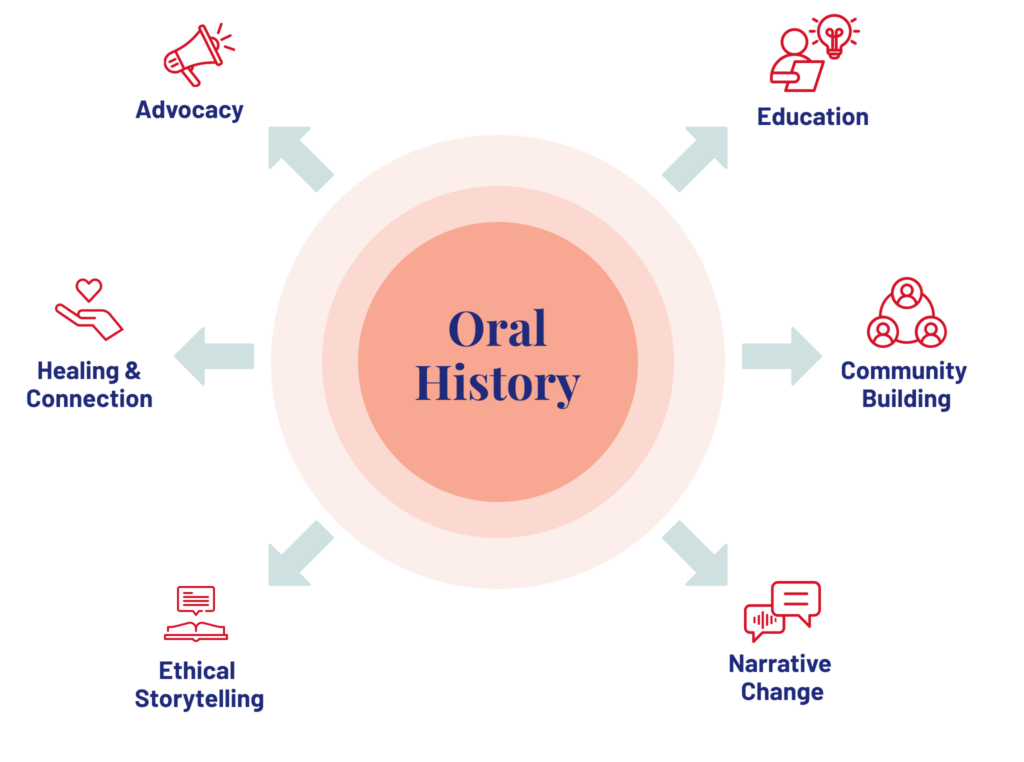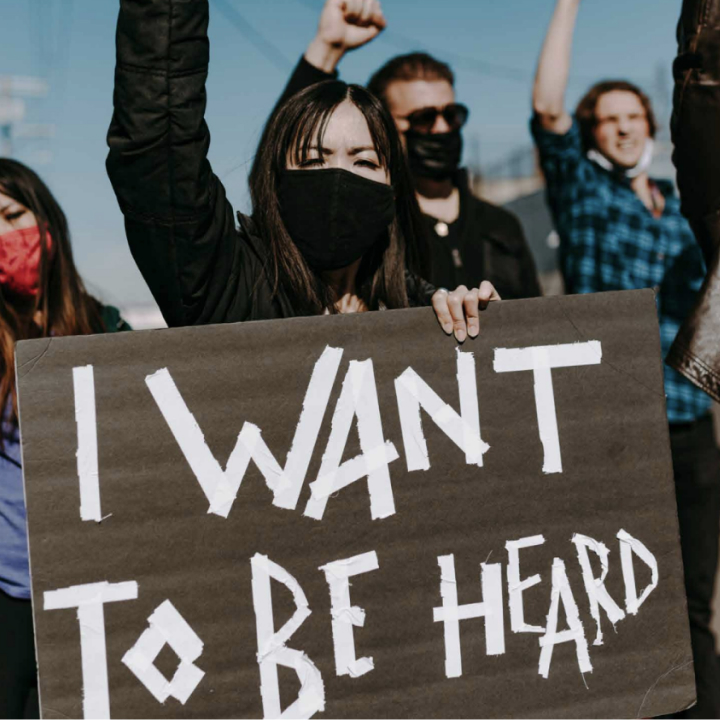Benefits of Oral History
Why does Voice of Witness focus on oral history? Below, we explore the transformative power of oral history storytelling and its many applications. We’d love to partner with you – reach out!
What is oral history?
According to the Oral History Association, “Oral history is a method of gathering, preserving, and interpreting the voices and memories of people, communities, and participants in past events.” An oral history interview generally consists of a well-prepared interviewer asking questions to a narrator, listening to their stories, and recording their exchange in audio or video formats, which can then also be transcribed, edited, archived, presented, and used in many ways.
Oral history is about lived experiences. It is about listening and being heard. It is about the real-life human impacts of policy and how communities’ histories are recorded and understood. All of this impacts how we make sense of the world and what we imagine is possible.
At Voice of Witness, we see it as a method of storytelling that can democratize history and contribute to narrative change. Sharing first-person stories from individuals and communities—in their own words—can illuminate issues and events in a profoundly powerful way. We believe oral history has the ability to build community, heal and support storytellers themselves, and advance justice through education and advocacy.
Why is oral history a valuable tool?

Oral history has a wide range of benefits and applications. Voice of Witness has worked with many different communities, organizations, educators, and practitioners in diverse fields to support them in using oral history to improve their work.
1. Oral history offers an ethical approach to storytelling.
Under the right circumstances, story sharing can be empowering and transformational for both audience and storyteller. However, too often—including in the context of mainstream journalism, media, entertainment, and the nonprofit industrial complex—stories are gathered through extractive processes and contribute to reductive sound bites, stereotypes, and harmful narratives.
Oral history prioritizes deep listening and nuanced attention to process, putting the storyteller in the driver’s seat and respecting complexity and authenticity. VOW’s methodology and ethical storytelling principles aim to support these practices by foregrounding values of dignity, transparency, collaboration, and equity.
2. Oral history can challenge harmful narratives and advance narrative change.
By its very nature, oral history can be subversive because it makes space for stories that otherwise might not be heard. It creates a platform for individuals and communities that don’t feel connected to or represented by dominant narratives to share their own lived experiences. It’s a tool to democratize history and amplify the voices of marginalized or silenced communities. By sharing stories in their own words, people can collectively build narrative power and advance narrative change—reframing issues of injustice, informed by those most impacted.
3. The oral history process can be healing and transformative for storytellers themselves.
There’s a range of reasons why people choose to share their stories. Some people hope that awareness will inspire change, and others simply want to be heard. While it’s important to be acutely aware of the potential trauma that asking deep questions can unearth, many narrators have noted that being interviewed and listened to feels cathartic and healing.
After sharing her story for the Voice of Witness book Inside This Place, Not of It: Narratives from Women’s Prisons, Ashley Jacobs said: “Knowing that someone had listened and shared my pain was amazing. I was free to cry, and I no longer feared speaking about my life. After the interview, I felt relief. It was healing for me.”
Soledad Castillo, narrator in Solito, Solita: Crossing Borders with Youth Refugees from Central America, noted: “I believe that telling one’s story is a way to healing. Sharing my own story has changed my life.”
In the article “It Was as Much for Me as for Anybody Else”: The Creation of Self-Validating Records, UCLA researchers note:
“For many storytellers, the process is life-changing. Narrators create records of their life stories for themselves—to feel validated, to see themselves as part of a larger community, to cleanse themselves of past trauma. In this way, record creation is a powerful assertion of existence, a declaration that ‘I am here,’ for those whose communities, perspectives, and experiences have been left out of or misportrayed by dominant historical narratives.”
4. Oral history is a powerful tool for education.
Oral history is valuable for teaching and learning and has many applications in educational settings. Reading oral history narratives provides students the unique opportunity to learn directly from individuals impacted by a particular issue—perspectives that are often left out of textbooks and mainstream curricula. Oral history inspires students to establish personal relationships and connections to the events and issues. It transcends the passive routine of remembering facts, figures, and dates and gives teachers and learners an engaging, tangible point of entry.
Students can also conduct their own oral history projects with peers, family, or community members. These projects foster vital student skills, including social-emotional learning, critical thinking, communication, and literacy. Conducting interviews and editing narratives can also cultivate empathy, challenge stereotyping and bias, and foster curiosity, belonging, and community engagement. Furthermore, storytelling has aspects that work for learners of many types, whether visual, auditory, or kinesthetic, as well as for English language learners.
The need for oral history education has never been more urgent. As schools face increased politicization and educational censorship, it is crucial to provide students with opportunities to engage with diverse perspectives in inclusive, culturally responsive learning environments.
5. Oral history is a valuable tool for advocacy.
First-person storytelling is a critical component of advocacy campaigns seeking social or political change, as it illuminates the real, human impact of policy decisions. Stories can help people understand the effects of unjust legislation and move them to take action.
Oral histories offer testimony of problems that require urgent attention and can serve as meaningful tools for organizations to support movement building and social change. Tracking the impact of our work at Voice of Witness has taught us that stories inspire change at the cultural, social, and policy levels.
6. Oral history supports community building.
For much of human existence, oral history was the primary vehicle for communities and cultures to share common history and create strong intergenerational links. As humans, we still instinctively seem to know that storytelling is an opportunity for connection, but many people feel disconnected in the modern era and are lacking these reflective, participatory forms of communication and connection.
Through its interpersonal interview-based approach, oral history is a valuable method of relationship and community building. The oral history process includes practices that promote trust, vulnerability, deep listening, empathy, and dignity. These practices develop strong connections and communication among community members, organizations, practitioners, and anyone looking to engage more deeply and thoughtfully. At Voice of Witness, we’ve seen nonprofits, schools, health care workers, lawyers, and more harness the power of oral history storytelling to build community and inclusion.
Work With Us
Voice of Witness offers expert storytelling and program support to organizations, educators, advocates, foundations, artists, and more. These collaborations harness the power of oral history to promote empathy, learning, and action. We work with partners to develop customized, interactive projects, workshops, and resources, using our award-winning oral history methodology to advance your mission.


